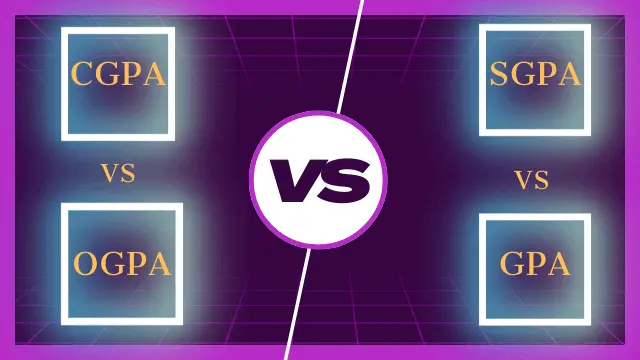I’ve been there. When I first started college, I had no clue what half of these meant. My advisor would throw around terms like “your SGPA this semester,” and I’d just nod along, pretending I knew what she was talking about. Don’t be like me. Let’s break this down so you understand what these numbers mean for you.
CGPA, OGPA, SGPA, GPA it’s like alphabet soup, but with your academic future hanging in the balance.
GPA – You must know about it
So GPA is probably the one you’ve heard the most about, especially if you’re in the US or planning to study there. It stands for Grade Point Average, and honestly? It’s pretty straightforward once you get the hang of it. GPA usually runs on a 4.0 scale. Like you get marks out of 4, like 3.8,3,2.7, like this
Not every class counts the same. Remember that super chill 1-credit “Introduction to College Life” seminar where you just talked about feelings for an hour? Yeah, that doesn’t hit your GPA nearly as hard as that brutal 4-credit calculus course that had you crying into your textbook at 2 AM.
Seems simple enough, right? But imagine doing this math when you’ve got a whole semester’s worth of classes, or worse – your entire college career. I’m talking 15, 20, maybe even 25+ classes all mixed. That’s when you start appreciating those GPA calculators online, trust me
GPA = (Sum of Grade Points) ÷ (Total Credits)

SGPA – Your Semester Report Card
SGPA stands for Semester Grade Point Average. SGPA is just your GPA for one specific semester. That’s it. Think of it as your quarterly performance review, but for school.
Why should you care about SGPA? Well, it’s pretty useful for tracking if you’re getting better or worse at this whole college thing. Had a rough freshman fall with a 2.8 SGPA? Spring semester’s 3.4 SGPA shows you’re figuring things out. It’s like a temperature check for your academic health.
I remember my junior year. I had one semester where I tried to take organic chemistry, statistics, and work 20 hours a week. My SGPA that semester was… let’s just say it wasn’t pretty.
SGPA = (Sum of Grade Points in that semester) ÷ (Total Credits in that semester)
Easy Tools to Use
CGPA – The Running Total That Actually Matters
CGPA is your cumulative GPA – basically, it’s your overall grades from day one mashed together into one number. This is the big one that shows up on your final transcript and the one employers and grad schools care about. Shows up on your final transcript.
Here’s what’s brutal about CGPA: those early semesters when you were still learning how to adult? Yeah, they stick around. That C+ in freshman biology doesn’t just disappear because you aced senior-level courses later. Your CGPA carries all your academic baggage with it.
But there’s good news too. If you start strong and maintain it, your CGPA becomes a solid foundation that can handle a few rough patches. And if you start weak but show consistent improvement? That upward trend in your semester grades can slowly but surely pull your CGPA up too.
CGPA = (Sum of all semester GPAs × Semester Credits) ÷ (Total Credits of all semesters)
OGPA – The Final Verdict (Mostly an Indian Thing)
OGPA is mainly used in India and some other countries. It’s your “Overall Grade Point Average” – your final academic score when you graduate. Think of it as your academic legacy number.
The difference between CGPA and OGPA can be confusing because some schools calculate them differently. Some places give more weight to your final year courses for OGPA, which is pretty fair when you think about it. You probably knew a lot more about studying .
If you’re studying in India or planning to, OGPA is what shows up on your final degree certificate. It’s what you’ll be quoting in job interviews and grad school applications.
OGPA = (Total Grade Points earned in all subjects) ÷ (Total Credits of all subjects)
| Term | What It Stands For | What It Means | When It’s Used |
| CGPA | Cumulative Grade Point Average | Your overall academic score across all semesters combined. Think of it as your “final report card” for your entire degree. | At the end of your course/program, to show total performance. |
| OGPA | Overall Grade Point Average | Almost the same as CGPA, but this term is mostly used in certain universities (especially agricultural or specialized institutes). | End of the course/program in specific institutions. |
| SGPA | Semester Grade Point Average | Your average score for just one semester. Like a progress card for that term only. | After each semester, track term-by-term performance. |
| GPA | Grade Point Average | A general term for average grades — can be for one semester or the whole course, depending on the system. | Common in the US and international systems; sometimes used as an alternative to CGPA/SGPA terms. |
Why This Alphabet Soup Matters
Here’s the real talk: these numbers follow you around more than you’d like. Applying for internships? They want your GPA. Trying to get into grad school? CGPA is usually a major factor. Some scholarship programs have strict cutoffs like you need a 3.5+ or you’re automatically out.
Still, don’t ignore these numbers. They’re like your credit score for academics you want them to be decent enough that they don’t close doors for you.
The International Headache
Planning to study abroad? Get ready for conversion confusion. A 3.7 GPA in the US doesn’t directly translate to any specific number in the Indian system. Different schools have different scales, different weighting systems, different everything.
My advice? When you’re applying anywhere, always include both your raw scores AND the scale they’re measured on. Don’t assume the admissions person knows that an 8.5 CGPA in your system is pretty good.
Real Talk: How to Improve These Numbers
Forget all the generic “study harder” advice. Here’s what works:
- Pick your battles. That elective pottery class might be fun, but if it’s going to tank your GPA because you have zero artistic ability, maybe take something you can handle while focusing on your major courses.
- Understand grade replacement policies. Some schools let you retake courses and replace the old grade. Others average them. Know your school’s rules – this can be a game-changer if you bombed a class early on.
- Don’t just chase the number. I’ve seen people take ridiculously easy classes just to boost their GPA, then struggle in higher-level courses because they never actually learned anything. Build a foundation, not a house of cards.
Final Thoughts
GPA, CGPA, SGPA, OGPA, they’re all just different ways of measuring the same thing: how well you’re doing academically. Some look at the short term, others at the big picture. Learn stuff. Develop skills. Make connections. The grades should follow from that, not the other way around. And if you’re still confused about what any of these mean at your specific school? Just ask. Seriously. Academic advisors, registrar offices, even older students most people are happy to explain this stuff. It’s way better than pretending you understand when you don’t.
